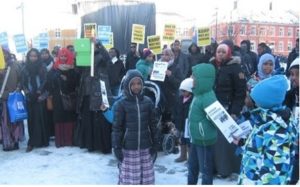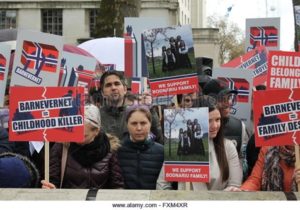By Hassan M. Abukar
The Somali community in Norway is at a crossroads. Norway is one of the wealthiest, safest, and most welcoming countries in the world. It is home to many immigrants who have fled poverty and lack of opportunities in their native countries. However, the country has some of the toughest child welfare services in the world; a record that has angered Norwegians and immigrants alike. Somali immigrants must learn Norwegian-approved child-rearing practices and the laws that govern them, but need a method to share that information across the community.
“We are definitely under the microscope,” a Somali community member in Norway said. “There is an intense debate now in Norway regarding the welfare of Somali children.”

Recently, a Norwegian TV channel aired a documentary about Somali children whose parents had returned them to Somalia and who subsequently suffered violence and other abuses. These parents were doing what the Somalis call “dhaqan-celis” meaning cultural rehabilitation, or a process in which children in the West are taken to Somalia to reform and learn their culture. As a result of the furor, the Norwegian government has tasked seven departments to look into the matter and make recommendations.
There are about 42,217 Somalis in Norway, making it the second-largest non-Western community in that country. The first few Somalis came to Norway in 1970 as seamen; others arrived after the Somali civil war started in 1991. About 50 percent of the Somali population in Norway is concentrated in Oslo. Interestingly, 17,000 of the 42,217 are children. Some Somalis have adapted to life in Norway and have become integral members of Norwegian society. Interestingly, Somalia’s current Prime Minister, Hassan Kheyre, and Mohamed Osman Jawari, speaker of Somalia’s Federal Parliament, are both Norwegian nationals.
Other Somali asylum seekers and refugees have settled in Norway in the past few years and are adjusting to their new home. “Almost 70 percent of Somalis fall into the latter category,” said Mahad Abdulle of Maqal Radio at a gathering in August 2017 where members of the Somali community in Oslo met a visiting Somali official.
During that meeting, it was clear the community’s main concern was the removal of Somali children, who were being taken from their homes by Barnevernet, the Norwegian Social Service Agency.
Tough Welfare System
Norway has rigorous child protection laws that have confounded many international critics. Barnevernet is responsible for the protection of children in the country. It is devoted to children’s rights, and promotes their well-being more than any other nation. According to the Child Welfare Act of 1992, Barnevernet’s main purpose is to “ensure that children and youth who live in conditions that may be detrimental to their health and development receive the necessary assistance and care at the right time and to help ensure children and youth grow up in a secure environment.”
According to Statistics Norway (2016), by the end of 2015, almost 36,800 children had received some type of services from Barnevernet, including counseling, social service visits, and day care assistance. About 60 percent of those receive services at home and 16 percent outside their homes—mostly in foster care or in institutions. The 36, 800 receiving some type of services represents 2.9% of all children in Norway.
The current controversy is not over Barnevernet’s provision of child welfare services, but its removal of children from their homes.
According to published government data, children are referred to Barnevernet for the following reasons: about 29 percent of the children have parents who lack parenting skills, 17 percent of the children have parents with a mental illness, 11 percent have experienced some type of domestic conflict, and 8 percent have parents abusing drugs.
Recently, domestic critics of Barnevernet have become vocal. In 2016, a Norwegian mother and her Romanian husband lost their five children to the agency. An evangelical Christian couple, Ruth and Marius Bodnariu, were accused of administering corporal punishment to their children, a charge Ruth admitted to Barnevernet case workers. In Norway, spanking children is illegal. The Bodnariu case became a media sensation when the BBC made a documentary about it.
Corporal punishment is outlawed not only Norway, but in 42 other countries around the world. However, Norway has raised its opposition to corporal punishment with unprecedented zeal. One Norwegian reverend took pains to refer to his country as a secular nation. “They have a new translation of the Bible that erases all the verses that talk about disciplining your children,” he said.
About 170 psychologists, social workers, and lawyers signed a petition last year condemning Barnevernet for its stringent child welfare rules and the excuses it uses to remove children from their homes. “Children are removed from the homes on very weak evidence characterized by speculative interpretations,” the signatories to the petition wrote. “Too often, we see biological parents who do not have all the world’s resources behind them, stand no chance against a big and powerful public apparatus. We see a tendency for decisions to be made based on incomplete observation basis and tendentious interpretations.” The signatories called for a reform of child welfare services and the end of policies that unfairly traumatize both children and parents.
Barnevernet officials point out that 90 percent of children receive services while at home and only 10 percent are removed from their parents. “The worst mistake is when we wait too long to take children from home,” the director of the agency said to SBS Australia.
International Outcry
In 2016, Czech President Milos Zeman compared the Norwegian child welfare system to Nazi Germany’s Lebensborn, a program in which the children of unmarried mothers were given to Aryan parents.
An Indian couple had their children removed from home because they fed them with their hands. A Brazilian woman in Norway sought refuge in her country’s embassy in Oslo after Barnevernet case workers quizzed her about her daughter’s eating habits, and a former Russian government official accused Norway of kidnapping children to solve the country’s low fertility rate.

According to a BBC report, eight child welfare cases in Norway were heard in the European Court of Human Rights in 2016. A Czech member of the European Parliament said there were “human rights violations [that] have occurred and that there is something dangerous in Norway.”
Romania, Lithuania, Poland, and Sweden have protested Barnevernet’s practices, which they say are ruining families.
Between 2005 and 2015, about 500 parents left Norway and illegally removed their children to settle elsewhere.
Are Somali children in danger?
Saeed Amin, a Somali Norwegian who works for an Oslo municipality, has been stopped many times in the streets and asked about the “3,000 Somali children” Barnevernet had taken. The staggering number of 3,000 did not surprise him because in Somali communities rumors oftentimes outpace facts. He decided to let the evidence speak to the community.
“The good thing is Norway documents everything and publishes it,” he said at a community gathering.
What did Amin find out?
“The notion among Somalis that there are 3,000 missing Somali children is baseless,” Amin said.
Equipped with the latest statistics of the Norwegian government, Amin said that, in fact, only 180 Somali children have been removed from their homes. “About 680 of our children are currently getting some type of services from the system,” he added.
Cultural issues
Many Somali children are raised in a culture that sits very close to the confluence of tradition and modernity. Spanking is acceptable in Somali society; parents administer corporal punishment, as do public school teachers and instructors of the Quran. There is a different system of child rearing in Norway to which Somali parents need to adjust.
One Somali community activist in Oslo observed a difference between how Somalis view their children and how Norwegians do. Somali parents raise their children so that when they grow up, the younger generation can help their parents, the community member said. “In Norway, parents raise their children for the betterment of society and, hence, it is not their sole responsibility.”
Community action
According to a young Somali Norwegian, there are more than 100 Somali organizations in Norway and Somalis are divided across clan lines.
Saeed Amin thinks there is one major thing the community lacks: unity.
“It is not shameful to have particular organizations, but we have to have an umbrella organization that speaks for all of us and furthers our interests,” he said at a community gathering. Being united in pursuit of a common purpose will make the community stronger and aid in the fight for its rights, he added.
The road to the future
In the end, it is what individual parents do that matters most. Sharpening parenting skills, understanding the social and educational system in Norway, and providing stability for children will help quell the Barnevernet controversy.
Hassan M. Abukar
————
Mr. Abukar is a contributor to WardheerNews and the author of Mogadishu Memoir. He can be reached at [email protected].
We welcome the submission of all articles for possible publication on WardheerNews.com. WardheerNews will only consider articles sent exclusively. Please email your article today . Opinions expressed in this article are those of the author and do not necessarily reflect the views of WardheerNews.
WardheerNew’s tolerance platform is engaging with diversity of opinion, political ideology and self-expression. Tolerance is a necessary ingredient for creativity and civility.Tolerance fuels tenacity and audacity.
WardheerNews waxay tixgelin gaara siinaysaa maqaaladaha sida gaarka ah loogu soo diro ee aan lagu daabicin goobo kale. Maqaalkani wuxuu ka turjumayaa aragtida Qoraaga loomana fasiran karo tan WardheerNews.
Copyright © 2024 WardheerNews, All rights reserved


